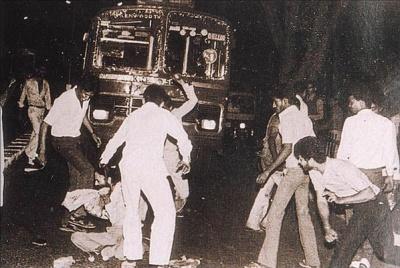
Sikh man being surrounded and attacked by mobs in 1984.
Earlier this month the Director of the Network of Sikh Organisations (NSO), Lord Singh of Wimbledon highlighted India’s persecution of Sikhs in 1984 during a debate on international declaration of genocides.
The debate in which many peers contributed was in relation to Lord Alton’s question to Her Majesty’s Government, ‘what steps they are taking to change the way formal international declarations of genocide or crimes against humanity are made and to further the expeditious prosecution of those responsible.’
Many of the contributors raised the genocide committed by ISIS against the Yazidis/Christians, and referred to the ongoing crisis in Burma. Genocides in the 1990s like those in Rwanda and Srebrenica were also mentioned during the discussion. Referring to the 1984 Sikh genocide and pointing to conflicting government trade interests, Lord Singh said an independent arbitration of the determination of genocide could be made by the High Court as suggestion by Lord Alton.
He said, ‘Every year we commemorate Holocaust Memorial Day and remember the systematic killing of and brutal atrocities against the Jewish community. Every year we remember and say “Never again”, but since the end of the Second World War we have seen many more systematic attempts to eliminate whole communities simply because of a difference of religion or culture. Worldwide revulsion at such inhuman behaviour led to the 1951 UN convention on crimes of genocide, including incitement to group murder.’
He went on: ‘By any measure, the deliberate mass killing of Sikhs in 1984 meets the necessary criteria, yet no action has been taken against government Ministers seen inciting rampaging mobs. The 30th anniversary of these killings coincided with the announcement of UK government support for an inquiry into the mass killing of Tamils in Sri Lanka. In a debate in this House, I asked for a similar inquiry into the mass killing of Sikhs in India and gave details of the scale of the atrocities: state-controlled All India Radio constantly repeating a message inciting people to kill Sikhs, the use of municipal buses to ferry groups of killers around New Delhi, the beating and burning of male Sikhs and the gang-raping of women and young girls. I concluded by asking Her Majesty’s Government to support the establishment of an international inquiry into the killings. But India is an important UK trading partner, and the curt answer from the Government was that that was a matter for the Indian Government.’
He continued. ‘Despite the setting up of the International Criminal Court in 2002 to prosecute genocide, offenders continue to escape punishment. Only countries that sign up to the ICC can be prosecuted, and some, such as the United States and India, fearing possible prosecution, simply do not sign up to membership. Other drawbacks are that the ICC cannot investigate crimes committed prior to its establishment, and there is no proper mechanism for pursuing possible genocide committed by militant groups such as Daesh against the Yazidis and other minorities in Syria. As has been mentioned, Governments are reluctant to raise questions of human rights abuse with important trading partners. We must face reality. Even when ethically untenable, considerations of so-called strategic interest in trade tend to trump abuse of human rights. The only long-term strategic interest for us all is to move to a world free from such recurrent genocides. To do this, we must take responsibility for examining possible genocide away from the conflicting and understandable pulls of government and give it to a wholly independent arbiter, such as the High Court, as suggested by the noble Lord, Lord Alton. I strongly support his wise and far-seeing lead.’

